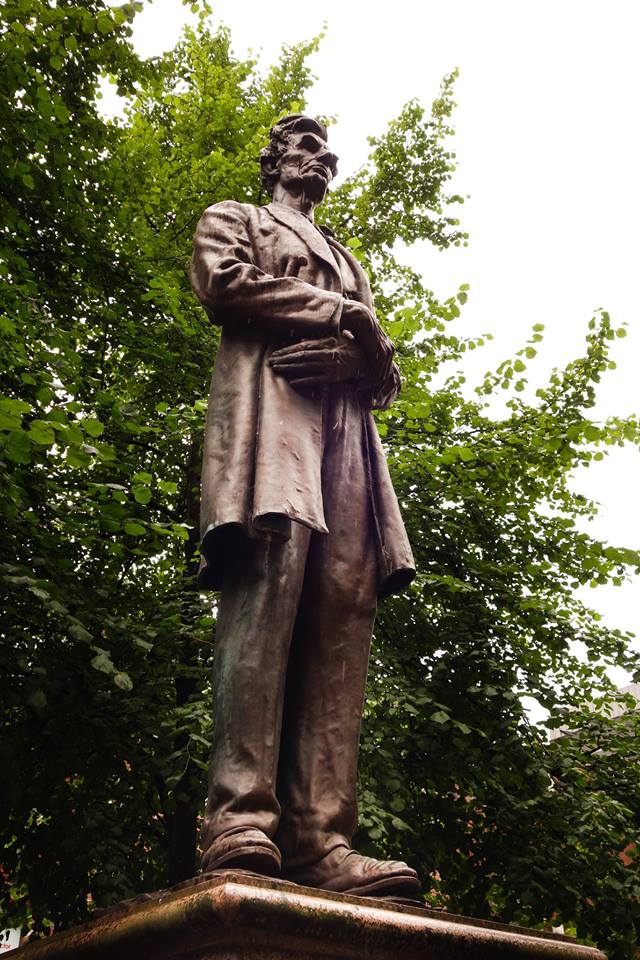
It seems like maybe we could all use a good story about a civil war statue, a good story about an American President, and a good story about the power of the common people against the rich and powerful, so I’m going to start with this one. It’s probably for the best that you’re reading this here because I haven’t managed to tell this story in person without crying.
I was in Manchester with a bit of time to spare on a cool, sometimes rainy morning that reminded me of home. Since I had a minute I turned on Pokemon Go on the off chance that there would be a Mr. Mime in range. As luck would have it there was one only two blocks away from my intended destination! The game led me to a small square and as I approached I could’ve sworn that it had an enormous statue of Abraham Lincoln right in the middle of it. Much to my dismay the closer I got, the more it looked like Lincoln. When I was close enough to read the inscription I learned that it was in fact, a statue of Lincoln. What was a statue of Lincoln doing in a lonely square in Northern England?!
Then it got weirder.
There was a large blue sticker that was somewhat haphazardly stuck onto the base of the statue that said something along the lines of “talking statues of Manchester” and had a QR code with no further explanation. There was no question, I had to know what that QR code said! I immediately installed a QR scanner and no sooner had I clicked the shutter button then my phone rang. That was weird and more than a little creepy, but if they say one thing about me when I’ve gone it will be that I never passed on an adventure.
I answered the phone.
There was no preamble, no explanation, just a man’s voice saying “to the working men of Manchester” he then continued in beautiful, archaic prose to praise the workers of Manchester and thank them for their courage and sacrifice. It seemed to be a letter and when it came to an end it was signed “Abraham Lincoln”. When he had finished uttering his name President Lincoln hung up on me. It was a tantalizing letter to a child of Lincoln’s far future standing alone in a rainy square, 4,500 miles away from home. President Lincoln did not bother to list the brave acts or to sum up the sacrifice. Why would he? The people of Manchester knew what they had done.
Luckily, after the phone call ended a screen popped up offering links to learn more. I stood in the drizzle, read an amazing story and wondered why I had never heard it before.
As you probably know during the Civil War the North imposed a naval blockade on the South. The economic hardship this caused was an important factor in the North’s victory. What I didn’t know was that the blockade also badly hurt the people of Lancashire, England. At that time the mills of Northern England produced the fabric that clothed the world. Seventy five percent of all the cotton grown on Southern plantations was sent to Lancashire where it was spun, dyed, and woven.
A year into the war and the embargo found Northern England in real distress. Sixty percent of its mills were shuttered, thousands of people were without work. The desperate wealthy mill owners started lobbying the British government to send the British Navy to break the blockade and let the cotton through.
Then an amazing thing happened. The workers themselves organized a mass meeting in the Manchester Union Hall to discuss the matter and those working class men, who had the very most to lose, chose to refuse cotton grown by enslaved hands. The blockade held and the men did indeed lose. In one town alone only five out of thirty-nine mills continued to operate. People went without fuel for heat, there was wide spread starvation, families lost their homes. And still–an ocean and a world away from a war in a place they had never seen–the people of Manchester chose to live and die by their values. They would not support slavery.
When the war ended that letter came from President Lincoln and it was followed shortly after by ships loaded with food and supplies for the people of Lancashire from the people of America, in gratitude.
And that is how I ended up crying in the rain 4,500 miles from home, in a square named for Lincoln in a country that he never set foot in.
I also caught my Mr. Mime.
If you are interested in reading the letter you can do so here: https://acws.co.uk/archives-misc-lincoln_letter
If you want to read more about the history you can do so here: http://www.bbc.com/news/world-21057494
and here:https://www.theguardian.com/…/lincoln-oscars-manchester-cot
Ms. Saville went public with this story on her Facebook page last month. Thanks to Wes Hogan for steering First to her post. B.D.